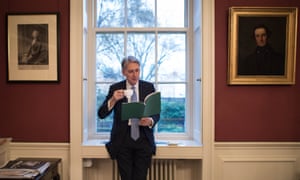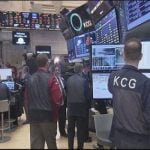
Philip Hammond has given a strong hint that the Conservatives may ditch their pledge not to raise VAT, national insurance or income tax, saying the flagship 2015 policy had constrained his ability to manage the economy.
The chancellor, who was recently forced to drop an attempt to raise national insurance for the self-employed, suggested the tax lock had hampered the government’s drive to reduce Britain’s budget deficit.
His words suggested the manifesto would provide leeway for the Tories to raise taxes in a future parliament if they felt it necessary.
Labour seized on the chancellor’s words as a “Tory tax bombshell”. The Labour leader, Jeremy Corbyn, responded quickly by saying that his party would maintain the triple lock on pensions.
Hammond’s comments in Washington DC came as Theresa May told factory workers in her Maidenhead constituency that the Tories would retain a pledge to allocate 0.7% of national income to international aid.
But the prime minister did not commit her party to the so-called triple lock for pensioners, which ensures that the state pension rises by the higher of the inflation rate, average earnings or 2.5%.
The statements by the chancellor and PM on three key policy areas could infuriate rightwing Tory MPs and grassroots activists who wanted to see aid spending reduced, and a commitment to pensions and lower taxes.
But they could help the Conservatives attract centre-ground voters. Insiders told the Guardian that senior Tories believe they could lose 10 to 15 seats to the Liberal Democrats in the snap June general election.
Hammond, whose revenue-raising plan targeting the self-employed had to be dropped within a week as a result of the 2015 tax triple pledge, said he wanted more flexibility to put the public finances back into shape.
“I’m a Conservative. I didn’t come into politics because I believe in higher taxes. I’m not in the business of having an ideological desire to raise taxes. But we need to manage the economy sensibly and sustainably. We need to get the fiscal accounts back into shape. It was self-evidently clear that the commitments that were made in the 2015 manifesto did and do today constrain the ability to manage the economy flexibly,” he said.
Aides – nervous about the reaction to his words – were quick to stress that the chancellor had not been talking about future plans and that no decisions had yet been taken about the manifesto. Later Hammond added: “We are and will always be the low-tax party. And Labour will always be the high tax party.”
However, he had hinted that he would return to the national insurance issue if the Conservatives won the general election. While refusing to say what would be in his party’s manifesto, he added that the different treatment of the self-employed was “something we need to look at”.
A report on the self-employed by Matthew Taylor, the chief executive of the Royal Society of Arts, is due to be completed in the summer. Hammond said this would provide “an opportunity to look again at some of these issues”.
Hammond was forced into a humiliating U-turn after the centrepiece of his first budget – a higher rate of national insurance contributions for the self-employed – was attacked for breaching the 2015 Conservative manifesto.
The decision to hold an early election also forces the chancellor to rethink his autumn statement commitment to eliminate the budget deficit by the end of the next parliament. The original pledge gave Hammond until 2025 to balance the books but if he stuck to the pledge he would now have to speed up the process of deficit reduction to meet the target by 2022.
The chancellor said the Treasury would look again at how it defined the timescale for achieving fiscal balance. “We have set out our ambitions and we have done this relatively recently in the autumn statement in terms of parliaments. Clearly as we’re going to have an election and the terms of parliament will fall on different date, we will need to restate our commitment in different terms and we will do that in the manifesto.”
Labour’s campaign chief, Andrew Gwynne, said the Tories were planning tax increases. “The real reason he’s doing it is because of his own economic failure, and the chaos of his first and so far only budget,” Gwynne said. He said the budget U-turn had “left a £2bn black hole in the Tories’ plans” and this was the first sign that Hammond’s party was backtracking on its 2015 pledge.
“What that basically means is that what people should expect, should the Tories win the next election, is that there’s a tax bombshell – a Tory tax bombshell – on the way, and you can bet your bottom dollar it will be hardworking low- to middle-earning families that will feel the pain because it’s those families that have felt the pain over the last seven years while there have been massive tax giveaways to those at the very top,” added Gwynne.
All parties are gearing up at speed for the surprise snap election announced outside Downing Street by May at the start of the week. The Conservatives have brought back their chief strategist from 2015, Sir Lynton Crosby, while departmental special advisers have started to move across to a new media operation being set up at party headquarters.
Some key aides – including the prime minister’s director of communications, Katie Perrior, and press secretary, Lizzie Loudon – have left their jobs. They both claimed that had always been the plan although there are rumours of tensions.
Labour has pledged to have candidates in place in every seat in the country by the end of next week and is launching a drive with new social media tools that will allow it to target advertising at individual voters in constituencies.
The Lib Dems have already selected their candidates and drafted a manifesto as their activists hit the streets in key target constituencies such as Twickenham in south-west London. Other parties are launching similar sprees.
[Source:- Gurdian]




